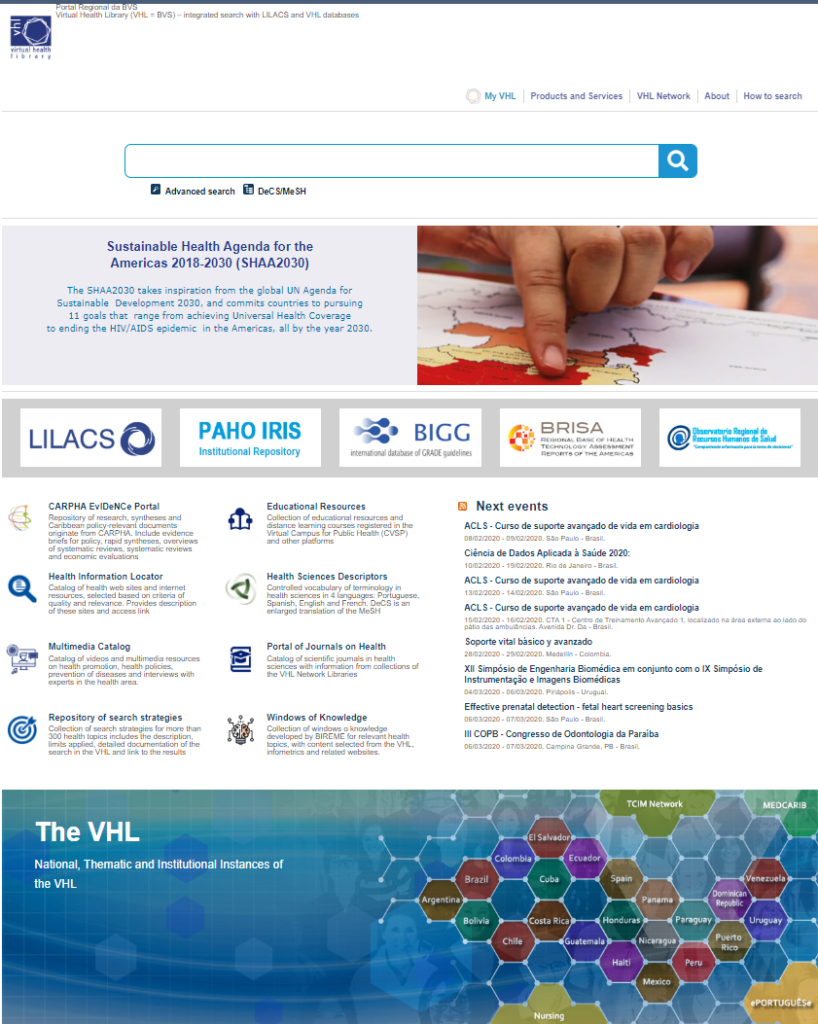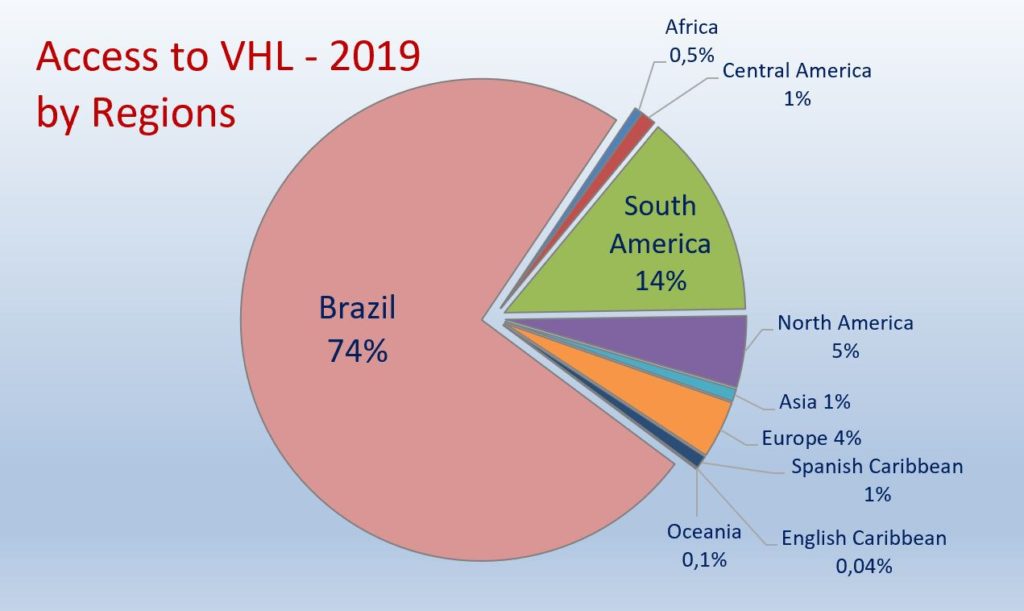More than 10 million access sessions, +41 million pageviews, +6.5 million users. What are these numbers? They are numbers of the year 2019 referring to the access and use of the information services offered by BIREME through the Regional Portal of the Virtual Health Library (VHL).
These services are intended to promote the democratization of equitable access to scientific and technical information in health, and to meet the information needs of health professionals in Latin America and the Caribbean, through the efficient use of VHL information sources, development and updating of research resources, user training and operation of other services for users.
The VHL Regional Portal is the main gateway to these services, and gathers more than 29 million bibliographic records from more than 30 databases, including Medline, LILACS, PAHO-IRIS Repository, national and thematic databases. In the year of 2019, a new search interface integrated to DeCS – Descriptors in Health Sciences was launched, in 4 languages (Portuguese, English, Spanish and French), with new resources that further facilitate the access process and use of information; and new databases were included in the collection, with emphasis on the International Base of Grade Guides (BIGG). The number of records with link to the full texts was also increased, summing up more than 11 million.
Any user connected to the Internet can access the sources of information and content of the of the VHL Regional Portal, through direct access to the Portal or through search engines such as Google and others, using a computer (desktop) or mobile device (cell phone or tablet).
 The performance indicators of the information access service are generated mainly from the records of access to the VHL Regional Portal and use of the search service that allows the user to retrieve the information and scientific evidence being searched. All access sessions, regardless of where or through where access comes from, are accounted for and generate indicators such as: country and city of the user; type of device used for access (desktop, mobile or tablet); number of pages viewed (pageviews); and also the number of sessions per day, time and average duration of the access sessions.
The performance indicators of the information access service are generated mainly from the records of access to the VHL Regional Portal and use of the search service that allows the user to retrieve the information and scientific evidence being searched. All access sessions, regardless of where or through where access comes from, are accounted for and generate indicators such as: country and city of the user; type of device used for access (desktop, mobile or tablet); number of pages viewed (pageviews); and also the number of sessions per day, time and average duration of the access sessions.
A summary of the main 2019 indicators related to the search service of the VHL Regional Portal:
- 10 Million access sessions by 6.5 million different users, 73% on a desktop and 27% on cell phone or tablet.
- 41 Million pageviews, corresponding to an average of 4 pageviews per session.
- Among all the services, the integrated VHL search registered the highest number of pageviews per session – almost 8 pages/session, and kept the user for longer on the service page – average of 7’96’.
 Who are the users of the VHL Regional Portal?
Who are the users of the VHL Regional Portal?
At the same time that access to the VHL Regional Portal is totally free and users do not have to identify themselves previously to access the Portal and the services available, it is not possible to know who the user is, if he or she is a student, researcher or health worker, where they work or what is their educational background. However, from analyzing the access indicators it is possible to identify the user’s location in the moment they access (city, region, country), if they are connected to an academic, state or commercial network, and if they use a computer (desktop) or a mobile device (cell phone or tablet).
In 2019, users from more than 200 countries in all regions of the world accessed VHL services, with the vast majority of accesses (90%) coming from users in Latin America and the Caribbean. Brazil is the country with the highest number of accesses (74%), followed by Mexico (3.7%), Argentina (3.4%), Colombia (3.1%) and Peru (3%).
 It is also interesting to know if the user accesses the services from a desktop computer, a cell phone or a tablet, once most of the VHL service platforms are already responsive to mobile devices.
It is also interesting to know if the user accesses the services from a desktop computer, a cell phone or a tablet, once most of the VHL service platforms are already responsive to mobile devices.
What conclusions can we reach from these indicators?
The information services that BIREME and its Network offer through the VHL Regional Portal have a high volume of accesses, even without the inclusion of many other portals that integrate the VHL Network and the access sessions to the DeCS Portal. However, when analyzing the geographical distribution of accesses, we continue with the challenge of expanding access to the VHL to users from some countries and subregions of Latin America and the Caribbean. Even in Brazil, when we analyze the geographical distribution of accesses, we identify they are concentrated in the South and Southeast, showing that it is necessary to promote with greater emphasis the access to the VHL in the North and Northeast as well.
Regarding access from mobile devices, this is a trend and indicates the importance of developing responsive platforms/portals.
All these actions contribute to fulfill BIREME’s mission of democratizing access to information, knowledge and scientific evidence in health throughout Latin America and the Caribbean.